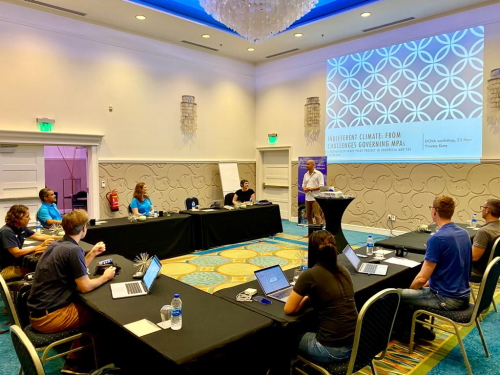 Willemstad:--- The 2021 Dutch Caribbean Nature Alliance (DCNA) Convention began with a workshop on climate change resiliency. The workshop served as a platform for knowledge sharing between researchers from the Royal Netherlands Institute for Southeast Asian and Caribbean Studies (KITLV), and Dutch Caribbean experts. The participants discussed the impact of climate change on marine ecosystems in the Dutch Caribbean and related issues.
Willemstad:--- The 2021 Dutch Caribbean Nature Alliance (DCNA) Convention began with a workshop on climate change resiliency. The workshop served as a platform for knowledge sharing between researchers from the Royal Netherlands Institute for Southeast Asian and Caribbean Studies (KITLV), and Dutch Caribbean experts. The participants discussed the impact of climate change on marine ecosystems in the Dutch Caribbean and related issues.
Different perspectives
This workshop is part of a pilot project that aims to unpack the impact of climate change on marine protected areas in Indonesia and the Caribbean. To get an accurate understanding of the key issues and challenges, listening to experts from various fields within and outside academia is key. Yvonne Kunz, a main postdoctoral researcher at KITLV notes that “if we want to understand the impact of climate change on marine protected areas, we must engage with those who experience this impact firsthand. This is our main motivation to obtain information from as many sources as possible.”
Collaboration with DCNA
David Kloos, project lead at KITLV, further explains that “DCNA has been involved from the very beginning of this pilot project. They represent a key stakeholder in the Caribbean.” The project is a comparative analysis, and the stakeholders are taking care to ensure that crucial comparisons are made from various angles. Mr. Kloos says that “policy versus actual operations is one aspect, but also the number of years of existence of the marine protected areas. We have chosen to investigate protected areas in Aruba and Bonaire, where there is a difference in years of existence. By comparing Indonesia and the Caribbean, KITLV can analyze yet another aspect. Whereas in the Caribbean the need to protect marine areas takes on a ‘bottom-up’ approach, in Indonesia the initiatives are more government-led. In addition, these contrasts facilitate the comparison and analysis of different conservation narratives.”
Climate change impact
For some, climate change is seen as a theoretical issue, even though the Caribbean region has already started to experience its effects. Melanie Meijer zu Schlochtern of DCNA states that “we have observed a deterioration of our coral reefs. The majority of our population may not be aware of this, but if we do not stop this decline, we can end up with green water, instead of the crystalline blue seas that we know today. If we can only become more aware of the economic value of these coral reefs, we will soon start to realize that further decline will have a direct negative impact on tourism, one of the main economic pillars of our islands.” Everyone can and must contribute to mitigation of the impact of climate change.
This pilot project is being conducted in partnership with the Netherlands Institute for Ecology (NIOO), the Netherlands Institute for Advanced Studies (NIAS), and various partners in Indonesia and the Caribbean. More information about this pilot project and practical tips can be found on DCNA’s Facebook page: DutchCaribbeanNatureAlliance.










